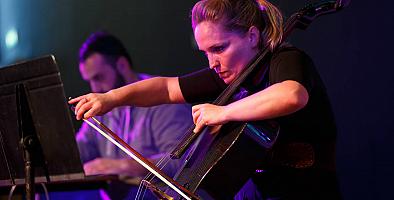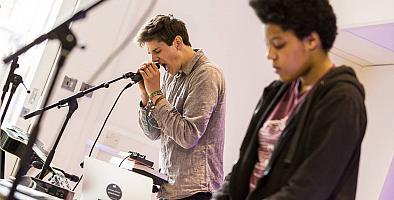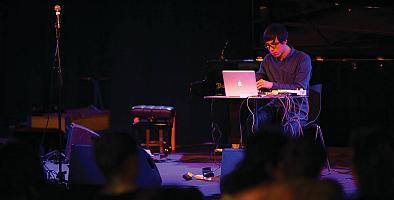Integrated Degree
Electronic Music, Computing & Technology (including Foundation Year)
Content navigation menu
Why choose the Integrated Degree in Electronic Music, Computing & Technology
This is a four-year degree with an integrated foundation year, where you study electronic music, composition, technology and computing.
- You'll compose and produce electronic music, work towards creating your own tools for music-making, developing your own digital musical instruments, building interactive installations, and working in sound design.
- This interdisciplinary programme provides the opportunity to build these skills and will prepare you for university life and to study our BMus/BSc Electronic Music, Computing and Technology.
- You'll develop a range of interdisciplinary and academic skills in music and computing.
- As well as developing your own musical practice in composition, you'll learn key skills in computing.
- With the help of personal and one-to-one tuition, you'll develop essential knowledge in areas such as mathematics and programming, creative musical skills, and academic skills such as essay writing, setting you up for success in your undergraduate degree.
- You'll have the chance to make and explore different styles of music with students across the Department of Music. Styles are varied and include laptop ensembles, instrumental ensembles, open mic nights, gamelan, mbira and improvising groups.
- You'll also have the opportunity to perform at open mics, student-run showcase and PureGold, our annual music festival that celebrates music created and performed at Goldsmiths.
- Studying in New Cross means you'll be within easy reach of many venues during your time with us, as well as those across the capital.
Contact the department
If you have specific questions about the degree, contact Naomi Matsumoto or Jenn Kirby .
UCAS code
W3I1
Length
1 year full-time (Foundation) followed by 3 years full-time (undergraduate degree)
Fees
Home - full-time: £9250
International - full-time: £20160
Departments
Music
Computing
Watch videos about this course
What you'll study
On this foundation year, you will study the following compulsory modules:
| Module title | Credits |
|---|---|
| Introduction to Musicology | 15 credits |
| Foundation for Composition | 15 credits |
| Foundations of Programming | 30 credits |
| Foundations of Mathematics for Computing | 30 credits |
| Building Your Research World | 30 credits |
Look at the BMus/BSc Electronic Music, Computing and Technology to see what modules are on offer for Years 1, 2 and 3.
Teaching style
The programme is delivered through a combination of small-group lectures, seminars, group and individual tutorials, workshops, and individual lessons.
We have a large staff team with a very wide range of research interests. We also regularly bring in external specialists to support our modules, or as instrumental/vocal tutors.
Practical and subject-related skills are developed through class-based tasks, either individually or in groups, (including analytic, listening-based, or discursive exercises), or by setting up and reviewing follow-up tasks undertaken outside of class through workshops where students are given the opportunity to offer peer feedback.
Entry requirements
We would normally expect applicants to have some level 3 study equivalent to grade C at A-level or PP in a BTEC Diploma. However, we will also consider experience of playing a musical instrument or other music-related experience. Offers will be made specific to your educational background and experience.
Admission is by interview and/or by submission of a portfolio. The portfolio should include two tracks of original music.
Alternative qualifications
See our full list of entry qualifications
We welcome students with a range of educational experiences. If you believe you may not meet the standard qualification requirements we would still encourage you to apply because we consider all aspects of your application when making a decision.
We’ll pay particularly careful attention to your personal statement, which is your opportunity to demonstrate your interest in the subject you’ve applied for. Your referees are also welcome to include any relevant contextual comments around your academic achievements. We’ll look at all these things when making a decision on your application, as well as your qualifications and grades.
International qualifications
We also accept a wide range of international qualifications. Find out more about the qualifications we accept from around the world.
If English isn’t your first language, you will need an IELTS score (or equivalent English language qualification) of 6.0 with a 6.0 in writing and no element lower than 5.5 to study this programme. If you need assistance with your English language, we offer a range of courses that can help prepare you for degree-level study.
Fees and funding
Annual tuition fees
These are the UG fees for students starting their programme in the 2024/2025 academic year.
- Home - full-time: £9250
- International - full-time: £20160
If your fees are not listed here, please check our undergraduate fees guidance or contact the Fees Office, who can also advise you about how to pay your fees.
It’s not currently possible for international students to study part-time if you require a Student Visa, however this is currently being reviewed and will be confirmed in the new year. Please read our visa guidance in the interim for more information. If you think you might be eligible to study part-time while being on another visa type, please contact our Admissions Team for more information.
If you are looking to pay your fees please see our guide to making a payment.
Funding opportunities
We offer a wide range of scholarships and bursaries, and our careers service can also offer advice on finding work during your studies. Find out more about funding your studies with us.
Additional costs
In addition to your tuition fees, you'll be responsible for any additional costs associated with your course, such as buying stationery and paying for photocopying. You can find out more about what you need to budget for on our study costs page.
There may also be specific additional costs associated with your programme. This can include things like paying for field trips or specialist materials for your assignments. Please check the programme specification for more information.
Careers
Careers for those with a music degree
This integrated degree is designed to provide the basis of knowledge, understanding and skills for a wide range of careers in fields related to music and computing. These include:
- Electronic music production
- Sound design
- Creative coding
- Audio development
- Teaching
- Performing
- Creative work in the media
- Arts administration
- Publishing and retail
- Record companies and production
- Community musicianship
- Technical work in radio or television
In particular, our module in Academic, Professional and Study Skills, in collaboration with our Careers service, gives you advice based on your personal career goals. The foundational skills in programming and mathematics within the Computing modules could lead to career opportunities in application programming, mobile app development, or web development.
Employment and industry links
The Music department has strong links with the music industry, employing professional musicians, producers, and artists as guest speakers and as lecturers. We also present frequent, high-profile speakers from the music industry at our talks and events. Recently, these have included Dave Okumu, Nigel Godrich, Darkstar, Mica Levi, Matana Roberts, and Arts Council Music Relationship Managers.
Find out more about employability at Goldsmiths.
Skills
Our degrees aim to equip you with a wide range of skills to meet the current demands of industry and increase your career prospects.
The programme provides opportunities for you to develop and demonstrate the wide range of transferable skills that employers are seeking. You will have access to specialist support via our Careers service, and via specialist events run by the department in conjunction with Careers and as part of our Dept Employability Action Plan.
Beyond music, you’ll get a strong grounding in skills that are important to the world of work. Employers look for initiative-driven people who think critically about their actions, work well with others and adapt quickly and creatively to new ideas. All of these skills are developed as part of this wide-ranging Foundation.
Industrial placement year
If you progress to the BMus/BSc Electronic Music, Computing and Technology degree, you’ll have the opportunity to complete an optional Industrial Placement Year between the second and third year of study. This gives you an invaluable opportunity to develop the practical skills and real-world experience that is sought after by employers. You’ll be supported throughout your placement year by a placement tutor, who provides you with guidance and liaises between you and your employer.
Staff
You'll learn from expert academics across the Department of Music and the Centre for Academic Language and Literacies.
The following staff teach on this programme:





